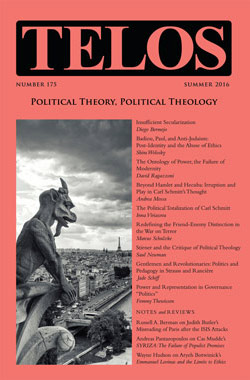 Critical theory inherited the mission of philosophy to know the world and to pursue the good life. Careful examination should shed light on the cosmos and our place within it and contribute to a beneficial ordering of human concerns, when wisdom informs governance. Yet that aspiration to know the world encountered the limits of intelligibility, beyond which reason could not proceed. Meanwhile, the efforts to remake the world in the spirit of reason elicited processes of rationalization, as deleterious to the world around us, the natural environment, as to the world within us, the ongoing cultural crisis of modernity and its social corollaries. That is Horkheimer and Adorno’s dialectic of enlightenment at the foundation of the critical theoretical tradition that continues to provide a framework with which to articulate a critique of the contemporary in its many heterogeneous facets: the disruption of all forms of solidarity, the pressures on family structures, the erosion of educational opportunities, the growing gap between rich and poor. Add to this the ominous shifts in the international order, including the breakdown of state structures from North Africa through the Middle East, the strains on the European Union, and the return of a repressive semi-dictatorship in Russia, while—at this point in the presidential election season—the United States seems to be tumbling dangerously toward Weimar conditions.
Critical theory inherited the mission of philosophy to know the world and to pursue the good life. Careful examination should shed light on the cosmos and our place within it and contribute to a beneficial ordering of human concerns, when wisdom informs governance. Yet that aspiration to know the world encountered the limits of intelligibility, beyond which reason could not proceed. Meanwhile, the efforts to remake the world in the spirit of reason elicited processes of rationalization, as deleterious to the world around us, the natural environment, as to the world within us, the ongoing cultural crisis of modernity and its social corollaries. That is Horkheimer and Adorno’s dialectic of enlightenment at the foundation of the critical theoretical tradition that continues to provide a framework with which to articulate a critique of the contemporary in its many heterogeneous facets: the disruption of all forms of solidarity, the pressures on family structures, the erosion of educational opportunities, the growing gap between rich and poor. Add to this the ominous shifts in the international order, including the breakdown of state structures from North Africa through the Middle East, the strains on the European Union, and the return of a repressive semi-dictatorship in Russia, while—at this point in the presidential election season—the United States seems to be tumbling dangerously toward Weimar conditions.
|
Cas Mudde’s book on Syriza’s “failure of populist promises,” which recently appeared in Greek, lends itself to multiple, successive readings of the current Greek populist experience in a comparative setting. One of the leading political scientists currently researching the populist phenomenon in both its radical-right and radical-left varieties, Mudde combines thorough knowledge of his subject matter’s ideological premises with a thorough analysis of his factual material, namely, the empirical cases he sets out to investigate. Indeed, it is to Mudde that we owe the term “pathological normalcy,” denoting the current form of radical-right populism in Europe. Mudde has used this term to explain the phenomenon of “mainstream thought” radicalization employed by the “populist radical right” with a view to exploiting a social and identitarian malaise that is widespread in several European countries. It is also to Mudde that we owe a number of thought-provoking and, in many respects, pioneering comparative studies (many of them co-authored or co-edited with his fellow political scientist Cristόbal Rovira Kaltwasser) about the differences between European and Latin-American populisms, in which Mudde demonstrates the latter’s rather inclusionary practices as opposed to the former’s rather exclusionary ones. Moreover, we owe him a very insightful discussion of the different outcomes produced when populist political parties come to power. |
||||
|
Telos Press Publishing · PO Box 811 · Candor, NY 13743 · Phone: 212-228-6479 Privacy Policy · Data Protection Copyright © 2025 Telos Press Publishing · All Rights Reserved |
||||


